⭐INQUIRE AND ACQUIRE⭐ LOOKING FOR BETTER GRADES? YOU ARE IN THE RIGHT PLACE!✅
An online platform containing verified documents of Question & Answers , 100% verified and approved by qualified personnel from Harvard University and University of New York, Guaranteed A+ score.
Information obtained from trained tutors and experienced collogue professors.
⚡OFFERS⚡
-Buy 2 bundles and get 1 free
-Buy 3 documents and get 1 free
NOW AVAILABLE; Request a desired document via stuvia message and receive it in 4 hours time
- 3350
- 0
- 365
Community
- Followers
- Following
18 Reviews received
3718 items
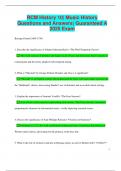
RCM History 10| Music History Questions and Answers| Guaranteed A 2025 Exam
RCM History 10| Music History Questions and Answers| Guaranteed A 2025 Exam Baroque Period () 1. Describe the significance of Johann Sebastian Bach's *The Well-Tempered Clavier*. This work consists of preludes and fugues in all 24 keys and showcases Bach's mastery in counterpoint and the newly adopted well-tempered tuning. 2. What is *Messiah* by George Frideric Handel, and why is it significant? *Messiah* is an English oratorio that popularized the form, with memorable choru...
- Exam (elaborations)
- • 24 pages •
RCM History 10| Music History Questions and Answers| Guaranteed A 2025 Exam Baroque Period () 1. Describe the significance of Johann Sebastian Bach's *The Well-Tempered Clavier*. This work consists of preludes and fugues in all 24 keys and showcases Bach's mastery in counterpoint and the newly adopted well-tempered tuning. 2. What is *Messiah* by George Frideric Handel, and why is it significant? *Messiah* is an English oratorio that popularized the form, with memorable choru...
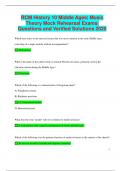
RCM History 10 Middle Ages| Music Theory Mock Rehearsal Exams| Questions and Verified Solutions 2025
RCM History 10 Middle Ages| Music Theory Mock Rehearsal Exams| Questions and Verified Solutions 2025 Which term refers to the musical texture that was most common in the early Middle Ages, consisting of a single melody without accompaniment? Monophony. What is the name of the earliest form of notated Western art music, primarily used in the Christian church during the Middle Ages? Plainchant. Which of the following is a characteristic of Gregorian chant? A) Polyphonic texture ...
- Exam (elaborations)
- • 20 pages •
RCM History 10 Middle Ages| Music Theory Mock Rehearsal Exams| Questions and Verified Solutions 2025 Which term refers to the musical texture that was most common in the early Middle Ages, consisting of a single melody without accompaniment? Monophony. What is the name of the earliest form of notated Western art music, primarily used in the Christian church during the Middle Ages? Plainchant. Which of the following is a characteristic of Gregorian chant? A) Polyphonic texture ...
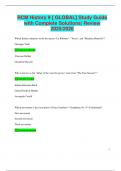
RCM History 9 [ GLOBAL] Study Guide with Complete Solutions| Review 2025/2026
RCM History 9 [ GLOBAL] Study Guide with Complete Solutions| Review 2025/2026 Which Italian composer wrote the operas *La Bohème*, *Tosca*, and *Madama Butterfly*? Giuseppe Verdi Giacomo Puccini Vincenzo Bellini Gioachino Rossini Who is known as the "father of the concerto grosso" and wrote *The Four Seasons*? Antonio Vivaldi Johann Sebastian Bach Georg Friedrich Handel Arcangelo Corelli Which movement is the focal point of Franz Schubert's *Symphony No. 8* (...
- Exam (elaborations)
- • 39 pages •
RCM History 9 [ GLOBAL] Study Guide with Complete Solutions| Review 2025/2026 Which Italian composer wrote the operas *La Bohème*, *Tosca*, and *Madama Butterfly*? Giuseppe Verdi Giacomo Puccini Vincenzo Bellini Gioachino Rossini Who is known as the "father of the concerto grosso" and wrote *The Four Seasons*? Antonio Vivaldi Johann Sebastian Bach Georg Friedrich Handel Arcangelo Corelli Which movement is the focal point of Franz Schubert's *Symphony No. 8* (...
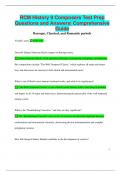
RCM History 9 Composers Test Prep Questions and Answers| Comprehensive Guide Baroque, Classical, and Romantic periods
RCM History 9 Composers Test Prep Questions and Answers| Comprehensive Guide Baroque, Classical, and Romantic periods Vivaldi's years Describe Johann Sebastian Bach's impact on Baroque music. Johann Sebastian Bach's work epitomized Baroque counterpoint, polyphony, and harmony. His compositions include "The Well-Tempered Clavier," which explores all major and minor keys and showcases his mastery in both choral and instrumental music. What is one of Bach's most fam...
- Exam (elaborations)
- • 22 pages •
RCM History 9 Composers Test Prep Questions and Answers| Comprehensive Guide Baroque, Classical, and Romantic periods Vivaldi's years Describe Johann Sebastian Bach's impact on Baroque music. Johann Sebastian Bach's work epitomized Baroque counterpoint, polyphony, and harmony. His compositions include "The Well-Tempered Clavier," which explores all major and minor keys and showcases his mastery in both choral and instrumental music. What is one of Bach's most fam...
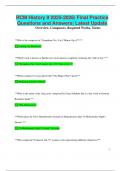
RCM History 9 2025-2026| Final Practice Questions and Answers| Latest Update Overview, Composers, Required Works, Terms
RCM History | Final Practice Questions and Answers| Latest Update Overview, Composers, Required Works, Terms **Who is the composer of *Symphony No. 5 in C Minor, Op. 67*?** Ludwig van Beethoven **Which work is known as Beethoven's most famous symphony, featuring the "Ode to Joy"?** *Symphony No. 9 in D minor, Op. 125 ("Ode to Joy")* **Which composer is associated with *The Magic Flute* opera?** Wolfgang Amadeus Mozart **What is the name of the song cycle composed by...
- Exam (elaborations)
- • 51 pages •
RCM History | Final Practice Questions and Answers| Latest Update Overview, Composers, Required Works, Terms **Who is the composer of *Symphony No. 5 in C Minor, Op. 67*?** Ludwig van Beethoven **Which work is known as Beethoven's most famous symphony, featuring the "Ode to Joy"?** *Symphony No. 9 in D minor, Op. 125 ("Ode to Joy")* **Which composer is associated with *The Magic Flute* opera?** Wolfgang Amadeus Mozart **What is the name of the song cycle composed by...
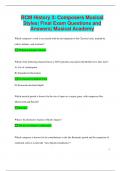
RCM History 3: Composers Musical Styles| Final Exam Questions and Answers| Musical Academy
RCM History 3: Composers Musical Styles| Final Exam Questions and Answers| Musical Academy Which composer's work is associated with the development of the Classical style, marked by clarity, balance, and structure? Wolfgang Amadeus Mozart. Which of the following characteristics is NOT typically associated with Beethoven’s later style? A) Use of counterpoint B) Expanded orchestration C) Classical symphonic form D) Increased emotional depth Which musical period is known f...
- Exam (elaborations)
- • 16 pages •
RCM History 3: Composers Musical Styles| Final Exam Questions and Answers| Musical Academy Which composer's work is associated with the development of the Classical style, marked by clarity, balance, and structure? Wolfgang Amadeus Mozart. Which of the following characteristics is NOT typically associated with Beethoven’s later style? A) Use of counterpoint B) Expanded orchestration C) Classical symphonic form D) Increased emotional depth Which musical period is known f...
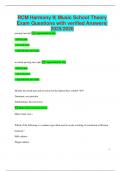
RCM Harmony 9| Music School Theory Exam Questions with verified Answers| 2025/2026
RCM Harmony 9| Music School Theory Exam Questions with verified Answers| 2025/2026 passing tone (pt) ~ approached by step ~ left by step ~ on weak beat ~ skip between two notes accented passing tone (apt) ~ approached by step ~ left by step ~ on strong beat ~ skip between two notes Identify the chord type and inversion for the figured bass symbol *6/4* Dominant, root position Subdominant, first inversion Major triad, second inversion Minor triad, root s Which of the ...
- Exam (elaborations)
- • 14 pages •
RCM Harmony 9| Music School Theory Exam Questions with verified Answers| 2025/2026 passing tone (pt) ~ approached by step ~ left by step ~ on weak beat ~ skip between two notes accented passing tone (apt) ~ approached by step ~ left by step ~ on strong beat ~ skip between two notes Identify the chord type and inversion for the figured bass symbol *6/4* Dominant, root position Subdominant, first inversion Major triad, second inversion Minor triad, root s Which of the ...

RCM ARCT History Terms Questions and 100% Verified Answers| 2025/2026
RCM ARCT History Terms Questions and 100% Verified Answers| 2025/2026 Which composer is known for his innovative piano music, such as the "Études" and "Nocturnes," which blend lyricism with virtuosic technique? Frédéric Chopin. What is the title of Beethoven's symphony that marks the transition from the Classical to the Romantic period, particularly due to its expansive structure and emotional depth? Symphony No. 3 in E-flat Major, "Eroica." Which of Franz ...
- Exam (elaborations)
- • 40 pages •
RCM ARCT History Terms Questions and 100% Verified Answers| 2025/2026 Which composer is known for his innovative piano music, such as the "Études" and "Nocturnes," which blend lyricism with virtuosic technique? Frédéric Chopin. What is the title of Beethoven's symphony that marks the transition from the Classical to the Romantic period, particularly due to its expansive structure and emotional depth? Symphony No. 3 in E-flat Major, "Eroica." Which of Franz ...
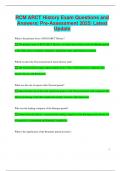
RCM ARCT History Exam Questions and Answers| Pre-Assessment 2025| Latest Update
RCM ARCT History Exam Questions and Answers| Pre-Assessment 2025| Latest Update What is the primary focus of RCM ARCT History? The primary focus of RCM ARCT History is to study music history from the Baroque period to the 20th century, including composers, significant works, and historical contexts. Which era does the Classical period of music history span? The Classical period spans approximately from 1730 to 1820, known for composers like Haydn, Mozart, and Beethoven. What was t...
- Exam (elaborations)
- • 19 pages •
RCM ARCT History Exam Questions and Answers| Pre-Assessment 2025| Latest Update What is the primary focus of RCM ARCT History? The primary focus of RCM ARCT History is to study music history from the Baroque period to the 20th century, including composers, significant works, and historical contexts. Which era does the Classical period of music history span? The Classical period spans approximately from 1730 to 1820, known for composers like Haydn, Mozart, and Beethoven. What was t...
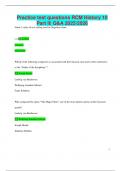
Practice test questions RCM History 10 Part II| Q&A 2025/2026
Practice test questions RCM History 10 Part II| Q&A 2025/2026 Name 3 styles of text setting used in Gregorian chant (1) syllabic neumatic melismatic Which of the following composers is associated with the Classical style and is often referred to as the "Father of the Symphony"? Joseph Haydn Ludwig van Beethoven Wolfgang Amadeus Mozart Franz Schubert Who composed the opera *The Magic Flute*, one of the most famous operas of the Classical period? Ludwig van Beethoven ...
- Exam (elaborations)
- • 53 pages •
Practice test questions RCM History 10 Part II| Q&A 2025/2026 Name 3 styles of text setting used in Gregorian chant (1) syllabic neumatic melismatic Which of the following composers is associated with the Classical style and is often referred to as the "Father of the Symphony"? Joseph Haydn Ludwig van Beethoven Wolfgang Amadeus Mozart Franz Schubert Who composed the opera *The Magic Flute*, one of the most famous operas of the Classical period? Ludwig van Beethoven ...

Indiana Cosmetology State Board Test Study Guide with 100% Correct Answers |LATEST|
Chipotle Manager Servsafe Exam |Question and Answers| VERIFIED!!! [Graded A+]
PADI Rescue Diver Final Exam |Question and Answer| 100% Correct [2024/2025]
Latest NAMs Menopause Certification Exam [100% Correct]
Cicerone Certified Beer Server Final Exam |Question And Answer| 100% Correct